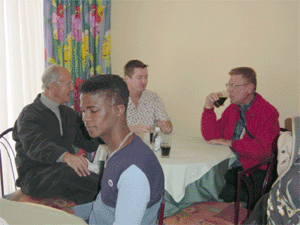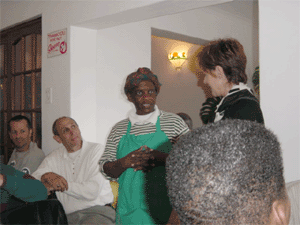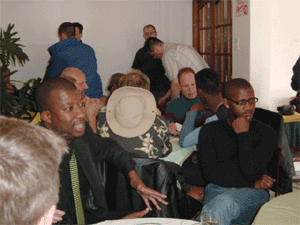|
South Africa,
Victoria Falls (Zambia) and Botswana
Hear Me Out: Black
Gay Soul in South Africa
By Mubarak Dahir
LETTERS From CAMP Rehoboth
November 21, 2001
Vol. 11, No. 15
I am in a group of 16 gay men touring Langa Township, and the
discomfort of some of my fellow companions is palpable. The
unremitting poverty that engulfs most of the quarter million
residents of South Africa’s oldest township, on the outskirts of
Cape Town, comes as an unanticipated shock to many of my fellow gay
travelers, as it would to all but the world’s poorest
residents.
At first glance, it may not appear the ideal vacation spot to bring a
bunch of affluent homosexuals. Located only a few miles from
downtown Cape Town, the township seems a world away from South
Africa’s gayest city.
But it is in the heart of Langa that I learn most about the soul of
gay South Africa.
Luckily, the host of the tour, David Rubin of DavidTours [DavidTravel], understands
the importance of experiencing the townships, saturated as they are
with the country’s history of oppression, its lingering poverty,
and its surprising optimism. Rubin is president of DavidTours
[DavidTravel],
the luxury tour operator with worldwide tours catering to the gay
community, including great jaunts to South Africa.
But Rubin goes beyond the standard tour of Langa Township, available
and highly recommended to any tourist who wants to get under the skin
of the new South Africa. At the end of the powerfully honest
expedition through Langa’s crowded homes and muddy streets,
Rubin deposits his band of open-eyed gay tourists at Lelapa
Restaurant. In Xhosa, the dominant language of Langa, the name
means “hope.” Inside, I am about to get a double course of
it.
 The
first comes from the tiny eatery’s matronly owner, a small,
cheerful woman draped in a plain green apron and wearing a tightly
wrapped headscarf that is a kaleidoscope of colors. Her fierce
pride and entrepreneurial spirit permeate the place, from the
immaculately scrubbed tile floors to the enthusiastic welcome she
offers her openly gay guests. The
first comes from the tiny eatery’s matronly owner, a small,
cheerful woman draped in a plain green apron and wearing a tightly
wrapped headscarf that is a kaleidoscope of colors. Her fierce
pride and entrepreneurial spirit permeate the place, from the
immaculately scrubbed tile floors to the enthusiastic welcome she
offers her openly gay guests.
“This is the new South Africa,” she says, almost
admonishingly, when I ask if she has ever before had her cozy
establishment totally overtaken by gay men. “We have no
more room for drawing those kind of differences.” I am surprised
when she cites the country’s new Constitution, and the
protections it specifically grants the country’s gay and lesbian
citizens. Throughout my trip, gay men and lesbians point to the
Constitution’s progressive stand on sexual orientation as a
cornerstone for the change that has taken hold here for gays and
lesbians in the past seven years. That an elderly black woman
in the heart of one of the historically anti-gay townships would do
the same is remarkable testimony to the powerful transformation of
South African society on fronts beyond the obvious one of race.
But her ambivalence to the sexual orientation of her guests is as
pragmatic as it is idealistic. She is a new entrepreneur, and
as a savvy businesswoman she knows better than to turn away guests of
any creed.
Grabbing my elbow, she now steers me in another direction, both
physically and conversationally. From the front room dotted
with half a dozen tables covered in hand-stitched cloths, we move to
the kitchen. There, she proudly spells out the ingredients and
spices stewing in great iron kettles on the stove. She
eventually spreads the feast on a long table in the anteroom
separating the cooking and dining areas. I pile my plate high,
sampling all of the eleven exotic delicacies, from chackalacka (a mix
of cabbage, green beans, baked beans, green peppers and onions stewed
in tomato sauce and flavored with curry) to moroho (spinach, onions
and squash mixed with a liberal toss of fresh chiles) to green sweet
potatoes doused in a blend of sugar and salt.
 Plate
in hand, I take a seat in the dining room where I get my second
serving of hope, served up by Roy Anthony. Plate
in hand, I take a seat in the dining room where I get my second
serving of hope, served up by Roy Anthony.
Tall, lanky and theatrical, Anthony is dressed in tight jeans and a
navy blue pull-over. Two silver chains dangle around his neck.
His thick black hair stands at attention in a flat top, while
the sides of his head are close-cropped, almost shaved. The
result gives maximum exposure to his prominent bone structure,
highlighted over his eyes with two thinly painted eyebrows.
A hair stylist, the 25-year-old youth talks about dressing to look
his best, his favorite dance clubs in the city and the difficulties
of getting alone-time with his boyfriend since they both live at
home. In many ways, Anthony could almost be any young gay man
anywhere.
Growing up in the township as an overtly gay teen was a bleakly
different story, remembers Anthony.
The other boys “used to call me moffie all the time,” he
says, invoking the South African equivalent of the word fag.
“They used to chase us and attack us with their hands.”
Even when he wasn’t being taunted, “I constantly heard
rumors, people talking about me.”
The big change, he says, came when the new Constitution was written,
explicitly spelling out protection for gays and lesbians. While
recognizing the legal power behind such a document, he says for him
personally and for many others, the transformation was less about
amending the law than it was about guiding social attitudes.
 He
admits there are plenty of challenges as he and his generation forge
their new gay identity. He
admits there are plenty of challenges as he and his generation forge
their new gay identity.
One of the biggest, he concedes, is overcoming the history of racial
tensions that linger between the country’s white and black gay
men. He notes that while the gay bars are not
“officially” segregated—as they once were—many
still are “in reality.” And just as important as racial
equality is the issue of economic segregation, he points out.
“I don’t think I could ever have a white boyfriend,”
he confesses. “I don’t think I could have that kind
of love for a white person, because of all that has
happened.”
Despite those misgivings, however, he insists there is not widespread
fear or anxiety between white and black gays in general.
“You can’t believe how things have improved,” he
says shaking his head. “Now we have a future
together.”
But even more, he relishes the bonds he has made with other black gay
men in the township. He knows of eight others, “and we
stick together like that!” he says, clasping his hands in an
emphatic motion.
Most in the previous generation of South Africa’s black gay men,
he knows, “didn’t have the luxury of struggling to create a
gay identity. With the political situation [apartheid],
it was all about race.”
But the 1994 Constitution “allowed me to take on a new
attitude,” he explains. “I thought, ‘I no longer
have to take this [harassment] from others!’ It was a
powerful personal revelation. And I think that was the
important thing that happened to people like me all over South
Africa. It gave us the power to go out and make
changes.”
|